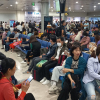The tightening of work visa regulations by the U.K. and Australia will significantly impact international students seeking residency but lacking outstanding skills, according to experts.
The U.K. has unveiled a strategy for significantly reducing migration and addressing misuse within the immigration system, which is set to bring about the largest-ever decrease in migration.
Last year it announced initiatives aimed at decreasing the issuance of student visas like prohibiting international students, except those enrolled in postgraduate research programs, from bringing dependents, and eliminating the option of switching to work visas before completing their studies.
These will be implemented in January.
Besides, from this spring the government plans to raise the minimum salary requirement for foreign workers by nearly 50%, from the current £26,200 to £38,700.
Only if they can earn that minimum salary foreign workers can apply for the skilled worker visa, which allows them to stay for five years.
Furthermore, the Migration Advisory Committee has been tasked with evaluating the graduate visa pathway to prevent any misuse.
On Dec. 11 Australia too announced a new immigration policy.
From this year the post-study work visa for international students (485 visa) will last only two to three years instead of the current two to six. The age limit for applying for this visa will be reduced from 50 to 35 years.
The two countries are among the six most preferred by Vietnamese students.
There are nearly 29,700 of them in Australia, with over 7,500 enrolled in vocational courses ranging from six to 24 months, and 7,100 Vietnamese students in the U.K.
 |
|
A group of Vietnamese students in Australia. Photo by VnExpress/Dinh Phuong |
Experts claimed the new regulations are aimed at reducing immigration and improving the quality of higher education, and could make it harder to obtain student visas.
Professor Tran Thi Ly, an international education expert at Deakin University in Australia, said applying for British and Australian student visas would no longer be as easy as in previous years, but she said to see how specifically it will be more difficult, students must wait until the policies are implemented.
“The post-graduation visa is considered a trump card to attract international students, and tightening policies will impact the number of students coming to those countries.”
A more noticeable impact will be the reduction in employment and immigration opportunities for students, particularly in Australia, according to Professor Hoang Lan Anh, a migration research expert at the University of Melbourne.
A survey done by Ly of 1,100 international students with temporary post-graduation work visas found that 76% considered the opportunity to obtain this visa an important factor in choosing to study abroad.
A study by Anh over the last three years found that most Vietnamese students going to Australia for education intend to settle there.
Those with adequate financial capacity, good English skills and credentials in fields needed by Australian employers would be minimally or not affected, she said.
But she warned it would significantly impact a particular group of people: vocational and university students who are not exceptionally skilled and are willing to take any job to stay after graduation.
Ly said there is research showing only about 50% of international graduates with the 485 visa find employment relevant to their education, and the rest take manual jobs that do not require university or college degrees, and nearly 30% switch from 485 to another type of visa to extend their stay in Australia.
Anh cited a 2019 study of skilled migrants in Western Australia to show that 41% of respondents lacked employment, which means they cannot find full-time, stable jobs, 20% were unemployed, and nearly 40% did simple jobs that did not require skills.
This is a significant issue for emigrant labor, including Vietnamese, who are assessed as having among the lowest English proficiency levels in Australia, she said.
“Many Vietnamese struggle with English and professional skills, finding it hard to work in their field after graduation. As their goal is permanent residency, the duration of stay is crucial, which means the longer they can stay in Australia, the more chances they have to get residency.”
Phuong Anh, a third-year student at the School of Oriental and African Studies, University of London, Britain, said most international students pay high tuition fees of £22,000 a year on average to study in the country, and usually wish to stay and work.
“But it is extremely difficult to find a job with such a high starting salary of £38,700 a year and get a company to sponsor a U.K. stay visa.”
She is considering returning home or finding a job in China, she added.
Nguyen Huyen Trang, a second-year student at the University of Tasmania, Australia, is also concerned about getting a job.
“The reduction in the stay in Australia by a year means fewer opportunities to experience the work environment or gain experience in my field of study.”
She is planning to apply for a skilled visa for a longer stay.
The new regulations will undoubtedly bring challenges but are reasonable in the context that the country wants to safeguard the rights of serious foreign students.
Lu Thi Hong Nham, director of Duc Anh Education Consulting and Translation Company, said when Australia relaxed visa policies after the pandemic, many businesses took advantage of it to bring laborers to Australia under the name of studying abroad.
“The Australian government is cleaning up where it needed to make room for serious and capable international students.”
Nguyen Thanh Sang, regional director for Vietnam and Singapore at IDP Education, believes the changes in the U.K. and Australia would help international students focus on their educational goals.
Though the 485 visa duration in Australia is shortened, excellent students could easily obtain other work visas, he said.
Nham said the first thing families need to ensure before sending their children abroad is stable finances and should not expect their children to earn money while studying abroad.
“There have been many cases of students studying abroad and not getting a job while still having to pay tuition.”
Lan Anh advised students to choose professions they like and are capable of working in.
She said many people choose from the list of professions required in Australia so that they could stay back, but that list constantly changes.
She pointed out that accounting and hairdressing were once prioritized, leading to a rush of international students into those fields, but later they changed or the skill assessment process became much more stringent.
Ly said Vietnamese students need to develop professional abilities, soft skills and networking right when they embark on their studies rather than wait until they are about to graduate.
- Reduce Hair Loss with PURA D’OR Gold Label Shampoo
- Castor Oil Has Made a “Huge” Difference With Hair and Brow Growth
- Excessive hair loss in men: Signs of illness that cannot be subjective
- Dịch Vụ SEO Website ở Los Angeles, CA: đưa trang web doanh nghiệp bạn lên top Google
- Nails Salon Sierra Madre
 VnExpress News The News Gateway of Vietnam
VnExpress News The News Gateway of Vietnam




